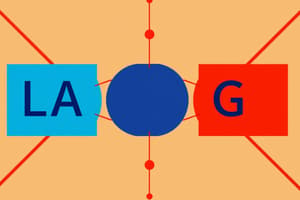Podcast
Questions and Answers
What does the commutative property state?
What does the commutative property state?
- x^y = y^x (correct)
- x v y = y v x (correct)
- ¬(¬ x) = x
- x ^ TRUE = x
What are the associative properties of Boolean algebra?
What are the associative properties of Boolean algebra?
(x^y) ^ z = x^(y^z) and (x v y) v z = x v (y v z)
What is the identity element for conjunction?
What is the identity element for conjunction?
TRUE
What does the double negative property state?
What does the double negative property state?
What is the idempotence property in Boolean algebra?
What is the idempotence property in Boolean algebra?
What are the distributive properties in Boolean algebra?
What are the distributive properties in Boolean algebra?
What is the complementation property?
What is the complementation property?
What do De Morgan's Laws state?
What do De Morgan's Laws state?
What does the annihilation property indicate?
What does the annihilation property indicate?
What does 'x → y' mean?
What does 'x → y' mean?
What does 'x ⟺ y' signify?
What does 'x ⟺ y' signify?
Flashcards are hidden until you start studying
Study Notes
Commutative Properties
- States that the order of variables does not affect the outcome.
- For disjunction: ( x \lor y = y \lor x )
- For conjunction: ( x \land y = y \land x )
Associative Properties
- Focuses on how variables are grouped in expressions.
- For conjunction: ( (x \land y) \land z = x \land (y \land z) )
- For disjunction: ( (x \lor y) \lor z = x \lor (y \lor z) )
Identity Elements
- Defines specific values that do not change the variable.
- For conjunction: ( x \land \text{TRUE} = x )
- For disjunction: ( x \lor \text{FALSE} = x )
Double Negative
- Shows that negating a negation returns the original value.
- Expressed as: ( \neg(\neg x) = x )
Idempotence
- Indicates that repeating an operation does not change the outcome.
- For conjunction: ( x \land x = x )
- For disjunction: ( x \lor x = x )
Distributive Properties
- Describes how conjunction distributes over disjunction and vice versa.
- Conjunction over disjunction: ( x \land (y \lor z) = (x \land y) \lor (x \land z) )
- Disjunction over conjunction: ( x \lor (y \land z) = (x \lor y) \land (x \lor z) )
Complementation
- Discusses the relationship between a variable and its negation.
- A variable and its negation yield FALSE when combined with conjunction: ( x \land (\neg x) = \text{FALSE} )
- A variable and its negation yield TRUE when combined with disjunction: ( x \lor (\neg x) = \text{TRUE} )
De Morgan's Laws
- Provides transformation rules for negating conjunctions and disjunctions.
- The negation of a conjunction: ( \neg(x \land y) = (\neg x) \lor (\neg y) )
- The negation of a disjunction: ( \neg(x \lor y) = (\neg x) \land (\neg y) )
Annihilation
- Reflects the effect of specific constant values on variables.
- Combining a variable with FALSE through conjunction results in FALSE: ( x \land \text{FALSE} = \text{FALSE} )
- Combining a variable with TRUE through disjunction results in TRUE: ( x \lor \text{TRUE} = \text{TRUE} )
Implication (x → y)
- Represents a logical relationship where one condition leads to another.
- Expressed as: "if x, then y"
- False only when ( x = \text{TRUE} ) and ( y = \text{FALSE} ); otherwise, it is TRUE.
Biconditional (x ⟺ y)
- Indicates mutual conditions between two variables.
- Means "x if and only if y"
- True only when both x and y share the same truth value; otherwise, it is FALSE.
Studying That Suits You
Use AI to generate personalized quizzes and flashcards to suit your learning preferences.




